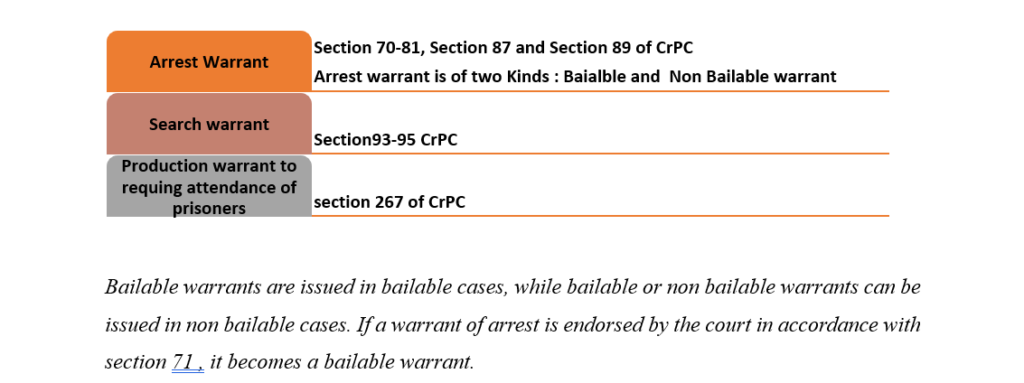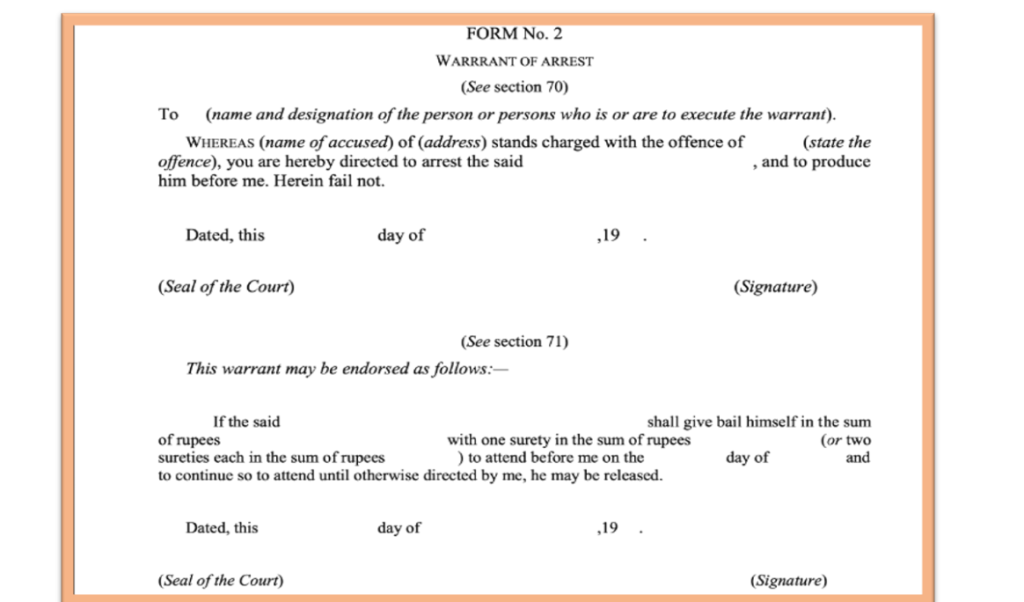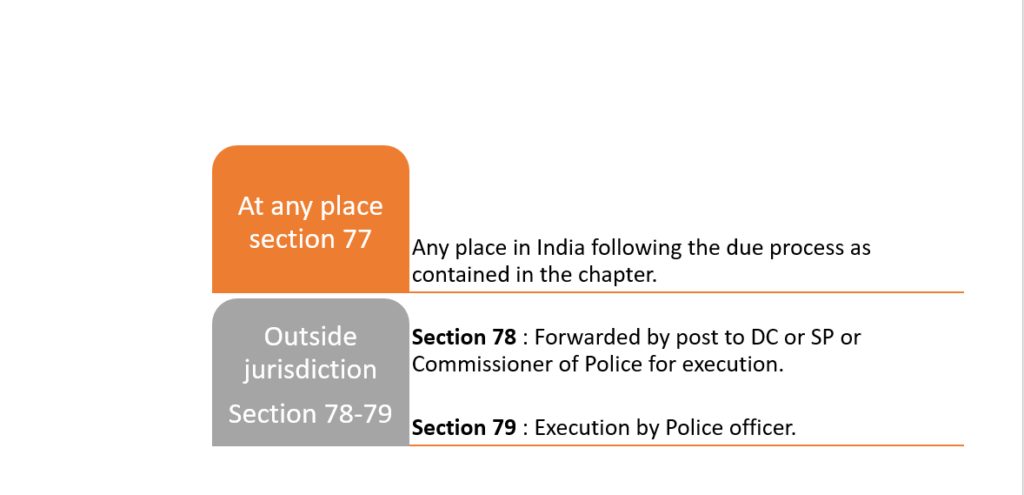Introduction
Warrant is a document issued by court authorizing the police or another body to make an arrest, search premises, or carry out some other action relating to the administration of justice.
Types of Arrest :
Warrant can be issued for following purposes:

Object of Warrant
- Warrant of arrest may necessarily not only be issued to compel the attendance of the accused but is also a preventive and precautionary measure.
- If a person commits a cognizable crime or is a habitual offender or an ex-convict, it is not in the public interest that such a person should be moving around freely.
- Even though the Criminal Procedure Code allows a person to be arrested without a warrant in certain cases, such a person cannot remain in custody for more than 24 hours from the time of the arrest.
- Further, if the person is prepared to give security to appear in court during trial, then in some instances, he may be released on bail.
- A warrant of arrest remains in force until it is executed or cancelled by the court which issued it.
- Accordingly, it was held in Emperor vs Bindra Ahirthat a warrant would not be invalid simply on the expiry of the date fixed by the court for the return of the warrant.
Provisions in CrPC :
In order to arrest and detain an accused, a warrant is issued by a court. A warrant is a written document issued by the court to compel the appearance or arrest of any person or search any place that the court requires.
The warrant of arrest has been dealt with under section 70 to 81 in the Criminal Procedure Code 1973.
Form and essentials of Warrant:
Warrant of arrest shall be in such form as is prescribed in Form No. 2 of the Second Schedule of this Code.

The following are the requisites of valid warrant
- It Shall be in writing.
- It shall be signed by the presiding officer of the court.
- It shall bear the seal of the court
- It, shall bear the name and designation of the person who is to execute it
- It must indicate clear name and address of the accused.
- It must also state the offence with which the accused is charged.
- It should indicate the date of issue.
A warrant once issued shall remain in force until it is cancelled or execute even though it bears a returnable date. A Magistrate is competent to issue warrant of arrest for production of a person before his own court and not before police officer.
CASE LAWS
Deivasigmani vs State 2003 , An application for recalling a non-bailable warrant was dismissed due to non-appearance of the counsel for the petitioner (accused). But the accused was very much present and surrendered before the Court and filed the application for cancellation Of the warrant. It was held that the application should have been considered on merits, but it was dismissed mechanically. The order of remand was set aside. It was passed without recording any reasons and in the absence of the witness and also without considering the fact that he was occupying a higher post in the Government.
Power to direct security to be taken Section 71:
Any Court issuing a warrant for the arrest of any person may in its discretion direct by endorsement on the warrant that, if such person executes a bond with sufficient sureties for his attendance before the Court at a specified time and thereafter until otherwise directed by the Court, the officer to whom the warrant is directed shall take such security and shall release such person from custody.
As per 71(2) The endorsement shall state-
- the number of sureties;
- the amount in which they and the person for whose arrest the warrant is issued, are to be respectively bound;
- the time at which he is to attend before the Court.
Whenever security is taken under this section as per 71(2), the officer to whom the warrant is directed shall forward the bond to the Court.
After the accused has been taken into custody, the liability of sureties comes to an end. If, subsequently, he absconds from the custody of the Court, the sureties cannot be held liable.’
Execution of Warrant : Execution of warrant issued by the court shall be carried out by the person who was directed by the court for that purpose. Provisions of section 72-74 are related to execution of warrant.
Direction of Warrants to Police officers or any person Section 72: According to Section 72 Ordinarily warrant is directed to one or more police officers but if no police officer is immediately available and immediate execution of warrant is necessary than the court may direct the execution of such warrant to any other person or persons.
When a warrant is directed to more officers or persons than one, it may be executed by all, or by any one or more of them.
Direction of warrant to any person for arrest of any escaped convict , proclaimed offender or person accused of Non Bailabe Offence Section 73:
CJM or a JMIC may direct a warrant to any person within his local jurisdiction for the arrest of any
- escaped convict,
- proclaimed offender or
- any person who is accused of a non-bailable offence and is evading arrest.
(2) Such person shall acknowledge in writing the receipt of the warrant, and shall execute it if the person for whose arrest it was issued, is in, or enters on, any land or other property under his charge.
(3) When the person against whom such warrant is issued is arrested, he shall be made over with the warrant to the nearest police officer; who shall cause him to be taken before a Magistrate having jurisdiction in the case, unless security is taken u//s 71.
Case Laws
State (CBI) vs Daud Ibrahim Kaskar 1997: The Supreme Court stated that the Magistrate has the power to issue a warrant u/s. 73 during an investigation also. This power can be exercised by him for bringing about the appearance of the accused person before the Court only and not before the police in the aid of investigation.
Washeshwor Nath Chadha vs State 1993: Where a person has been residing in Dubai for the last many years and he is neither an escaped convict, nor proclaimed offender nor is evading arrest (though named in FIR) but is required only for interrogation, issuance of warrant for his arrest by a Delhi Court, for being produced, so that investigating officer may join him in investigation, was held to be without jurisdiction.
Indar Mohan Goswami vs State of Uttaranchal 2008: Supreme Court observed that Non-bailable warrants should be issued with due care. The Supreme Court enumerated the circumstances in which non bailable warrants should be issued as follows:
Non bailable warrants should be issued to bring a person to the court when summons of bailable warrants would be unlikely to have the desired result.
This should be
- when it is reasonable believe that the person will not voluntarily appear in the court, or
- police authorities are unable find the person to serve him with a summon, or
- it is considered that the person could harm someone if not placed into custody immediately.”
In another landmark case of Vikas vs State of Rajasthan 2014 directions in Indar Mohan Goswami vs State of Uttaranchal 2008 was reiterated and was held by the Supreme Court that before issuing non bailable warrant other tools for compelling of appearance (summons and bailable warrants ) should be exhausted so that it could not impair the personal liberty guaranteed by Constitution of India.
Section 74 Warrant directed to Police Officer: A warrant directed to any police officer may also be executed by any other police officer whose name is endorsed upon the warrant by the officer to whom it is directed or endorsed.
In simple terms, what is required under this section is endorsement by one police officer to another of the execution of warrant. But the endorsement must be in the name of Police Officer and not by his designation. No other person other than the police officer to whom the warrant of arrest is endorsed is competent to execute it.
Notification of substance of warrant Section 75: The police officer or other person executing a warrant of arrest shall notify the substance thereof to the person to be arrested, and, if so required, shall show him the warrant.
This section requires that the substance of the warrant must be notified to the person to be arrested.
Substance of warrant to the person (who is to arrested) must be conveyed or notified by the person as directed by the Court under section 73 and 74 of code of criminal Procedure.In addition to that warrant should also be shown to him.
In the case of Satish Chandra Rai vs Jodu Nandan 1899 it was held that warrant must be shown to the person to whom it is and he must have opportunity to read it.
If the public servant executing a warrant of arrest does not notify the substance to the arrested person in accordance with this section, he will be acting violation of law. The police officer must not proceed to make arrest unless he is in possession of a warrant of arrest because the person to be arrested has right to see it.
- Person arrested to be brought before Court without delay (Section 76):The police officer or other person executing a warrant of arrest shall (subject to the provisions of section 71 as to security) without unnecessary delay bring the person arrested before the Court before which he is required by law to produce such person: Provided that such delay shall not, in any case, exceed twenty- four hours exclusive of the time necessary for the journey from the place of arrest to the Magistrate’ s Court.
Same provision has been provided under section 57 of the code which read as under:
Person arrested not to be detained more than twenty- four hours. No police officer shall detain in custody a person arrested without warrant for a longer period than under all the circumstances of the case is reasonable, and such period shall not, in the absence of a special order of a Magistrate under section 167, exceed twenty- four hours exclusive of the time necessary for the journey from the place of arrest to the Magistrate’ s Court.
Execution of Warrant : Section 77-79 contains the provisions regarding execution of warrant.

Section 77: This section provides that a warrant of arrest may be executed at any place in India. This provision does not impose any restriction upon the power of the police officer.
The section only declares that, every warrant issued by any Magistrate in India may be executed at any place in India; execution of the warrant is not restricted to the local limits of the jurisdiction of the Magistrate issuing the warrant or of the Court to which he is subordinate. It means warrant of arrest issued by court empower police officer to execute it any place of India.
Procedure for execution:
Section 78: According to section 78 of the Criminal Procedure Code, when the warrant is to be executed outside local jurisdiction then, such warrant will not be directed to the police officer. Instead, it will be directed to any Executive Magistrate, District Superintendent of Police or Commissioner of Police within whose local jurisdiction the warrant is to be executed they may further endorse the name of the police officer thereon.
Crux of this section is that when a warrant is to be executed outside the local jurisdiction of the court such warrant is issued to the authorities within the local limits of whose jurisdiction it is to be executed.
Case Laws:
S.Velappan vs. The State of Kerala 1965:
It was held by the Kerala High court that warrant under this section directing arrest of the proprietor of a firm without mentioning either the name or the description of the person to be arrested is not valid.
Section 79. Warrant directed to police officer for execution outside jurisdiction
- When a warrant directed to a police officer is to be executed beyond the local jurisdiction of the Court issuing the same, he. shall ordinarily take it for endorsement either to an Executive Magistrate or to a police officer not below the rank of an officer in charge of a police station, within the local limits of whose jurisdiction the warrant is to be executed.
- Such Magistrate or police officer shall endorse his name thereon and such endorsement shall be sufficient authority to the police officer to whom the warrant is directed to execute the same, and the local police shall, if so required, assist such officer in executing such warrant.
- Whenever there is reason to believe that the delay occasioned by obtaining the endorsement of the Magistrate or police officer within whose local jurisdiction the warrant is to be executed will prevent such execution, the police officer to whom it is directed may execute the same without such endorsement in any place beyond the local jurisdiction of the Court which issued it.
Section 80. Procedure of arrest of person against whom warrant issued:
This section lays down the procedure for the production of the arrested person in cases where the execution of warrant takes place outside the jurisdiction of the Court which issued the warrant. According to this section –
- When a warrant of arrest is executed outside the district in which it was issued, the person arrested shall be taken before executive Magistrate or District Superintendent or Commissioner of that district in which arrest was made except following circumstances-
- If the court which issued the warrant is within 30 km of the place of arrest.
- If the court which issued the warrant is nearer than the executive Magistrate or District Superintendent or Commissioner of police within the local limits of whose jurisdiction the arrest was made.
- If the security is taken under section 71 of this chapter.
Section 81: Procedure by Magistrate before whom such person arrested is brought
Section 81 says that the Executive Magistrate or District Superintendent of Police or Commissioner of Police shall, if the person arrested appears to be the person intended by the Court which issued the warrant, direct his removal in custody to such Court:
Provided that, if the offence is bailable, and such person is ready and willing to give bail to the satisfaction of such Magistrate, District Superintendent or Commissioner, or a direction has been endorsed under section 71 on the warrant and such person is ready and willing to give the security required by such directions the Magistrate, District Superintendent or Commissioner shall take such bail or security, as the case may be, and forward the bond, to the Court which issued the warrant: Provided further that if the offence is a non- bailable one, it shall be lawful for the Chief Judicial Magistrate (subject to the provisions of section 437), or the Sessions Judge, of the district in which the arrest is made on consideration of the information and the documents referred to in sub- section (2) of section 78, to release such person on bail.
(2) Nothing in this section shall be deemed to prevent a police officer from taking security under section 71,
While acting under sub-section (1) the Magistrate has to be prima face satisfied that the person arrested is the person mentioned in the warrant.’ He need not make an elaborate inquiry as to the identity of the arrested person. The word “shall” in sub-section (1) is mandatory and not directory. Therefore, if to the Executive Magistrates etc. the person “appears. to be the person intended by the court then Where a person intended by the Court, he must direct his removal in custody to such court, subject of course to the provisos.
In the case of Ranvir Singh vs Deshraj 1983 it was held that the court of CJM or the court of sessions used in second proviso means the court having territorial jurisdiction concerning the offence.



